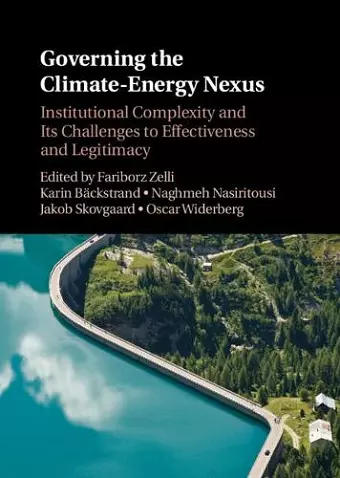Governing the Climate-Energy Nexus
Institutional Complexity and Its Challenges to Effectiveness and Legitimacy
Karin Bäckstrand editor Jakob Skovgaard editor Fariborz Zelli editor Naghmeh Nasiritousi editor Oscar Widerberg editor
Format:Hardback
Publisher:Cambridge University Press
Published:16th Jul '20
Currently unavailable, and unfortunately no date known when it will be back

Analysing the interactions between institutions in the climate change and energy nexus, including the consequences for their legitimacy and effectiveness.
Combating climate change and transitioning to fossil-free energy are two central and interdependent challenges facing humanity today. Governing the nexus of these challenges is complex, and includes multiple intergovernmental and transnational institutions. This book analyses the governance interactions between such institutions, and explores their consequences for legitimacy and effectiveness. Using a novel analytical framework, the contributors examine three policy fields: renewable energy, fossil fuel subsidy reform, and carbon pricing. These fields are compared in terms of their institutional memberships, governance functions and overarching norms. Bringing together prominent researchers from political science and international relations, the book offers an essential resource for future research and provides policy recommendations for effective and legitimate governance of the climate-energy nexus. Rooted in the most recent research, it is an invaluable reference for researchers, policymakers and other stakeholders in climate change and energy politics. This title is also available as Open Access on Cambridge Core.
'Far too little work looks at climate change or energy studies from an interdisciplinary social science perspective, and far less than that does so effectively. This book is a notable exception, expertly tracing the governance dynamics and dilemmas of climate change as well as its twin partner in crime, the global energy system. In doing so, it covers a range of exciting topics, from subsidy reform to institutional complexity, from renewable energy to policy coherence, through a compelling milieu of different perspectives. The book is truly important reading for anyone who professes to take the study of climate governance seriously.' Benjamin K. Sovacool, University of Sussex, and author of Global Energy Justice (Cambridge)
'If we are to prevent catastrophic global warming, the world needs to establish more effective global governance of energy. This carefully planned book brings together contributions by leading experts and provides an insightful macro perspective on the current climate-energy nexus - its institutional complexity and fragmentation, as well as the potential for change. The volume stands out for its rich empirical analysis, coherence and rigour. A must read!' Robert Falkner, London School of Economics and Political Science
'Governing the Climate-Energy Nexus offers a novel approach to understanding the vexing challenge of decarbonizing the global energy system and moving towards a more sustainable future. Drawing on diverse theoretical debates in political science and international relations, the authors present rich empirical analyses that help academics and practitioners navigate the complex institutional landscape of global climate and energy governance and evaluate the trade-offs and synergies between different policy options. Moreover, this book advances the growing field of 'nexus' research by breaking new theoretical and methodological ground that will facilitate more effective and legitimate governance systems in an increasingly interconnected global system.' Michele M. Betsill, Colorado State University
ISBN: 9781108484817
Dimensions: 249mm x 175mm x 23mm
Weight: 670g
292 pages